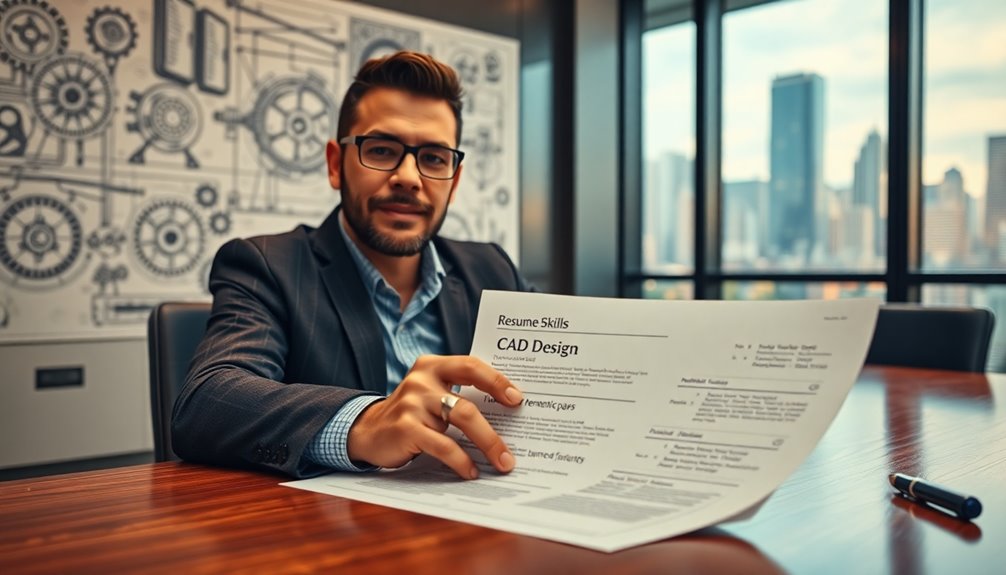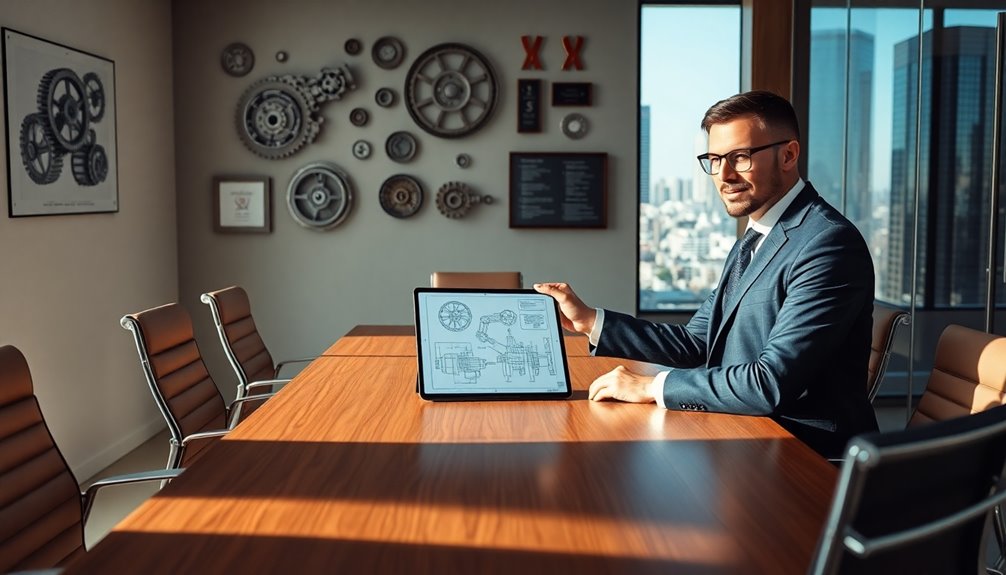Acing your mechanical engineer interview starts with knowing what to expect at each stage. You'll want to highlight your skills in CAD, thermodynamics, and project management, showing you can tackle technical challenges. Effective communication is key; practice simplifying complex ideas and using visuals to engage your audience. Be ready to demonstrate your problem-solving abilities with specific examples using the STAR method. Finally, emphasize your teamwork and adaptability. Conclude the conversation with a thank-you note to leave a lasting impression. As you gear up, there's even more to uncover about making your interview a success.
Key Takeaways
- Research common interview questions and practice your responses to demonstrate both technical knowledge and problem-solving abilities.
- Showcase your hands-on experience with prototyping and testing to highlight practical skills in mechanical engineering.
- Utilize the STAR method to effectively communicate past challenges and the solutions you implemented during your projects.
- Prepare to discuss specific technical concepts clearly, using visual aids if necessary to enhance understanding.
- Follow up with a thank-you note to express gratitude and reinforce your professional demeanor post-interview.
Understanding the Interview Process

Steering through the interview process can feel intimidating, but understanding its structure can greatly enhance your confidence. First, you should familiarize yourself with the different stages: the initial screening, technical interview, and final assessment. Each stage has a specific focus, so prepare accordingly.
Research common questions and practice your responses, especially around your experiences and problem-solving abilities.
Next, remember to showcase your passion for engineering and your enthusiasm to learn. It's also essential to ask insightful questions, as this indicates your interest in the role and the company.
Finally, follow up with a thank-you note after the interview; it reflects professionalism and reinforces your interest. By knowing what to expect, you can approach the interview with a clearer mindset.
Key Technical Skills to Highlight

Technical skills are the backbone of any successful mechanical engineer, and highlighting them during your interview can set you apart from the competition.
Focus on your proficiency in CAD software, as it's essential for design and modeling tasks. Showcase your understanding of thermodynamics, fluid mechanics, and materials science, which are vital in engineering problem-solving.
Don't forget to mention your experience with project management tools, as they demonstrate your ability to organize and lead projects effectively. Emphasize your hands-on experience with prototyping and testing, showing that you can bring designs to life.
Finally, be prepared to discuss specific technical challenges you've overcome, as this illustrates your problem-solving capabilities and deepens your technical expertise.
Effective Communication Techniques

Mastering effective communication techniques is essential for success in mechanical engineering, especially when you've already highlighted your technical skills.
You need to convey complex concepts clearly and adapt your style to different audiences. Use visual aids, like diagrams, to enhance understanding and keep your audience engaged.
Practice active listening; it shows respect and helps you grasp their needs. When presenting ideas, simplify your language to avoid jargon that could confuse clients or team members.
Regular feedback is vital—ask for it to refine your communication strategies. Build rapport with clients and colleagues to foster trust, making it easier to share ideas and collaborate effectively.
Demonstrating Problem-Solving Abilities

In the fast-paced world of mechanical engineering, demonstrating your problem-solving abilities is essential for standing out in interviews and real-world projects.
Use the STAR method—Situation, Task, Action, Result—to clearly articulate your approach to challenges. Share specific examples, like how you tackled a design flaw or improved a process.
Highlight your analytical thinking and how you've collaborated with cross-functional teams to generate innovative solutions. Describe your use of root cause analysis to address underlying issues effectively.
Don't forget to mention any brainstorming sessions you led, emphasizing the diversity of perspectives that contributed to successful outcomes.
Showing your adaptability and willingness to learn from failures will further illustrate your problem-solving prowess, making you a compelling candidate.
Showcasing Project Management Experience

When you showcase your project management experience during an interview, it's crucial to highlight your ability to set clear objectives and deliverables.
Discuss specific projects where you defined goals and tracked progress effectively. Mention your strategies for monitoring timelines and budgets, as well as how you adjusted plans when challenges arose.
Emphasize your risk management techniques; outline how you identified potential issues and mitigated them.
Be ready to share examples of how you documented processes for future reference and evaluated outcomes for continuous improvement.
This not only demonstrates your organizational skills but also your commitment to achieving successful project results.
Showing these competencies will set you apart as a capable mechanical engineer ready for leadership roles.
Emphasizing Teamwork and Collaboration

Successful engineering projects hinge on effective teamwork and collaboration. When you're part of a team, clear role definitions are vital. They help prevent overlap and confusion, allowing everyone to focus on their strengths.
Regular communication fosters accountability, ensuring that each member knows their responsibilities and deadlines. Emphasizing diverse skill sets within the team can lead to innovative solutions, as different perspectives spark creativity.
During your interview, highlight instances where collaboration led to project success. Discuss how you've contributed to positive team dynamics, perhaps by mediating conflicts or encouraging open dialogue.
Show that you value teamwork not just as a buzzword, but as an essential component of engineering success. Your ability to collaborate effectively will set you apart.
Preparing for Behavioral Questions

Preparing for behavioral questions can make a significant difference in your interview performance. These questions often assess how you've handled various situations in the past, so you'll want to be ready.
Here are four tips to help you prepare:
- Use the STAR Method: Structure your answers by discussing the Situation, Task, Action, and Result to provide clear and concise responses.
- Reflect on Your Experiences: Think about challenges and successes you've faced in your career, focusing on teamwork, problem-solving, and leadership.
- Practice Aloud: Rehearsing your responses can boost your confidence and help you articulate your thoughts better during the interview.
- Stay Honest and Authentic: Authenticity resonates well with interviewers, so be genuine in your responses.
Continuous Learning and Adaptability

Continuous learning and adaptability are essential traits for mastering the engineering field. As technology evolves, you need to stay updated on industry trends and advancements. Engage in workshops, seminars, and online courses to enhance your skills and knowledge. Networking with professionals can provide valuable insights and foster collaboration.
Moreover, adaptability allows you to pivot when projects change or challenges arise. Embrace feedback and be willing to adjust your approach based on new information. This flexibility not only improves your problem-solving abilities but also helps you thrive in dynamic environments.
Cultivating a culture of learning within your team encourages innovation and resilience, ensuring you're always prepared for the next challenge in your engineering career.
Frequently Asked Questions
What Are the Most Common Interview Formats for Mechanical Engineers?
When preparing for mechanical engineering interviews, you'll encounter various formats.
Commonly, you'll face behavioral interviews, where you share past experiences, and technical interviews that assess your engineering knowledge.
Some companies use case studies to evaluate your problem-solving skills, while others conduct panel interviews involving multiple interviewers.
It's also popular to have a practical assessment or project review.
Familiarizing yourself with these formats will boost your confidence and readiness.
How Can I Effectively Research the Company Before My Interview?
How well do you know the company you're interviewing with?
To effectively research, start by exploring their website to understand their mission, values, and recent projects.
Check news articles and press releases for updates or achievements.
Don't forget to look at employee reviews on platforms like Glassdoor.
Engaging with their social media can also give you insights into their culture.
This knowledge will help you tailor your questions and demonstrate your genuine interest during the interview.
What Attire Is Appropriate for a Mechanical Engineering Interview?
For a mechanical engineering interview, you should aim for professional attire that reflects your seriousness about the role.
A well-fitted suit or business casual outfit—like dress pants and a collared shirt—works well.
Make sure your shoes are polished and appropriate.
Avoid overly casual items like jeans or sneakers.
How Do I Follow up After the Interview?
How do you make a lasting impression after your interview? Following up is key!
Send a thank-you email within 24 hours, expressing gratitude for the opportunity and highlighting a key discussion point. This shows your enthusiasm and professionalism. Keep it concise and sincere.
If you haven't heard back in a week or two, a polite follow-up can reaffirm your interest.
What Salary Range Can I Expect as a Mechanical Engineer?
As a mechanical engineer, you can expect a salary range typically between $70,000 and $100,000 annually, depending on your experience, location, and the industry you work in.
Entry-level positions might start closer to $60,000, while seasoned professionals or those in specialized roles can earn considerably more.
It's essential to research your specific market and consider factors like company size and project complexity to gauge your earning potential accurately.
Conclusion
To summarize, preparing for your master mechanical engineer interview is like honing a finely tuned machine; every part needs to work in harmony. By showcasing your technical skills, problem-solving abilities, and teamwork experiences, you'll stand out to hiring managers. Remember to communicate effectively and demonstrate your adaptability and commitment to continuous learning. With the right mindset and preparation, you're not just a candidate—you're the ideal choice ready to drive innovation and success. Good luck!









